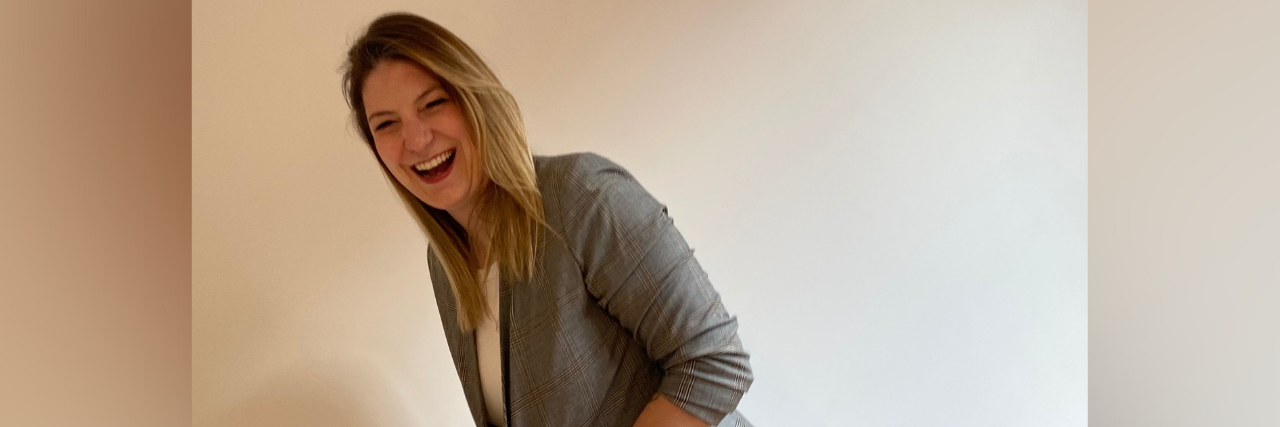Asking for Help When You're Suicidal Is Strength, Not Weakness
Editor's Note
If you experience suicidal thoughts, the following post could be potentially triggering. You can contact the Crisis Text Line by texting “START” to 741741.
I have had three suicide attempts. Each time, the choice came from a desire to make the unbearable emotional pain end. What I didn’t realize in the moment was it was also a cry for help — I desperately wanted support, but did not know how to ask for it.
For years, I felt like sharing my pain and asking for help made me a burden. I felt like it made me weak. I thought for a long time what I was experiencing was a flaw in character, a shortcoming, rather than a mental illness. I thought if I tried harder, I could be better, different, “normal.” Part of the problem was I was uneducated and uninformed when it came to mental health and mental illness and I wasn’t equipped with the language to explain or understand what I was going through.
Once I learned the names for my disorders and the fact there was treatment for them, I also started experiencing the stigma that comes along with mental illness. People expect you to snap out of it, people think it is “all in your head,” people find it uncomfortable to talk about. I thought being strong was refusing to impose my struggles on others. I thought it was struggling silently and trying to mitigate the symptoms alone.
Asking for help is not weakness. It is actually a great sign of strength. Asking for help requires vulnerability and trust, it requires opening up to someone and being honest about what you’re experiencing. It takes so much strength to do that.
The last time I tried to kill myself, I woke from the coma nearly a week later. The overdose had been severe, but so was the pain that encouraged me to attempt suicide. When I woke up, I lay in a hospital bed with wires and IVs coming out of me like an extension of my blood vessels. Several in each arm and one sewn right into my femoral artery. Once again, the ugliest parts of me were on display. I felt so vulnerable. At the same time, I felt profound gratitude for having survived. I felt gratitude for all I had yet to accomplish that I would still have the chance to. I felt gratitude for the people who were still around, who were also grateful I had survived.
I had to come to terms with the fact I wanted help. That a part of me didn’t want to die and wanted to find the will to live again. I began my journey of recovery and started learning, growing and managing my illnesses better. I learned to rely on the supports in my life: my loved ones, my circle of friends, the mental health professionals who were helping me. It was not a linear journey; I had steps forward and backward, but the general trajectory was forward. I was progressing.
Several years later, I found myself tackling suicidal thoughts again. I felt the hopelessness coming on, the shame and the desire not to be a burden. Through everything I had learned, through the growth I had undertaken, I now had a better understanding of what it meant to ask for help. I asked someone I trusted to take me to the hospital. We drove to the closest emergency room and I explained, through tears, to the triage nurse I needed emergency mental health support.
I was admitted and sent to the waiting room to eventually be called in by a physician. After I was cleared of any physical issues, I waited again, this time for the crisis team. I was eventually called into a bland room with a few armchairs. I sat in my hopelessness waiting for someone to appear. Eventually, the crisis team came. It was one nurse. Her face looked so familiar. She looked at me and I could see recognition in her eyes as well.
We had met before. She had been the nurse on the psychiatric ward when I was there years earlier. She had made my three weeks there bearable. She had shown me compassion and kindness and had been there to listen to me and talk to me for hours.
She asked me what was going on and I started talking. I explained the situation and the first thing she said to me was how proud of me she was. I was confused. Here I was battling suicidal thoughts, in the emergency room, crying my eyes out, and she was proud of me. She told me how far I had come and how this situation would have played out very differently had it been just a few years prior. She commended me for having the strength to ask for help. She helped me find confidence and helped me celebrate the fact this was a huge sign of growth. I was now able to ask for what I needed no matter how dark a place I was in. I left that emergency room feeling proud of myself, too.
My situation may be extreme, but the concept remains the same. If you are experiencing anxiety, if you are feeling depression, if you are simply struggling with all the stressors of our world, you deserve support. It is a great display of strength to ask for help, to make yourself vulnerable and to ask for what you need.
If you are feeling alone, there are resources, there are places to reach out to. It is OK to ask for help. You are not a burden. You should not feel shame. You are not alone.
Original photo by author

